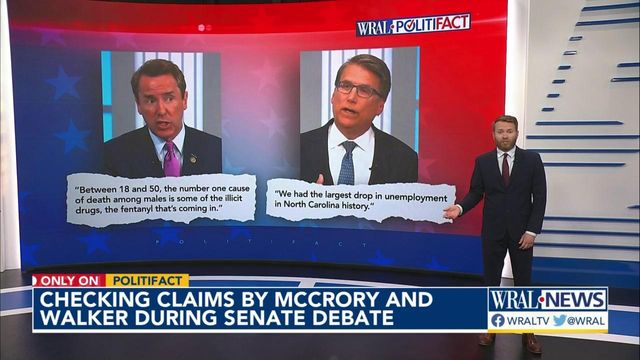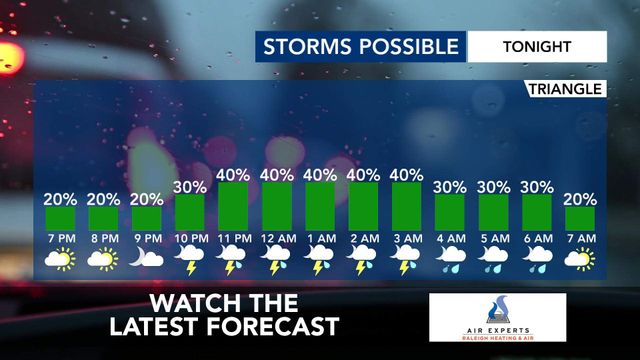Fact checking McCrory, Walker claims from the WRAL U.S. Senate debate
Republican U.S. Senate candidates Pat McCrory and Mark Walker used a televised debate to tout their records as former elected officials.
But their versions of history didn’t always track with the facts.
McCrory, a former North Carolina governor, and Walker, a former congressman from the Greensboro area, squared-off Thursday in an WRAL News debate for top Republicans seeking to replace Sen. Richard Burr, who’s retiring at the end of his term this year.
Missing from the stage was U.S. Rep. Ted Budd, who is endorsed by former president Trump and is leading in key polls. Budd’s campaign said he skipped the debate to instead speak with voters face-to-face.
McCrory and Walker made several claims about themselves and Budd, including the four below that stood out to PolitiFact North Carolina.
McCrory: NC chamber supported ‘bathroom bill’
WRAL News debate host Lena Tillett asked McCrory if he would sign the controversial House Bill 2 law again, if given another opportunity.
The law, known as the “bathroom bill” or “HB2,” required transgender people to use bathrooms that aligned with the sex designated on their birth certificates in government buildings. The law received backlash from opponents who called it discriminatory against transgender people. Numerous organizations canceled plans to launch or expand businesses in North Carolina. Some political experts believe McCrory lost his reelection campaign in 2016 in part because he signed the bill.
Responding to Tillett, McCrory said he didn’t regret signing the bill. “It was passed in a bipartisan way. Democrats and Republicans voted for it. In fact, the state chamber of commerce supported it.”
The North Carolina Chamber of Commerce was noticeably mum about the law when it was first signed, as WRAL reported in 2016. It has also pushed back against McCrory’s previous claim that they helped write the bill.
In an email to WRAL on Friday, the chamber disputed McCrory's claim.
“The N.C. Chamber did not support and had no part in suggesting, drafting or reviewing House Bill 2, and anyone who suggests otherwise is misrepresenting the facts,” said Kate Catlin Payne, the chamber’s vice president of communications.
We emailed McCrory’s campaign spokesman about the chamber’s email, but didn’t receive a response.
Walker: Democrats vote against life for babies
In recent years, Republicans in Congress and in legislatures around the country have introduced multiple bills that they claim will close a legal loophole allowing clinicians to essentially neglect a baby until it dies.
Walker was likely referencing one of these bills in Thursday’s debate when he recalled a specific vote: “We were battling back and forth on this piece of legislation we had offered: Should a baby be allowed to live if it miraculously survives a botched abortion? At the end of the night, only three Democrats voted that that baby should be allowed to live.”
PolitiFact NC asked Walker’s campaign spokesman for more details about the vote the former congressman referenced, but didn’t receive a response. Democrats have generally opposed the so-called “born alive” bills because many legal experts dispute the idea that there’s a loophole in the law—or that the legislation is needed.
Arthur Caplan, a bioethicist at New York University’s Grossman School of Medicine in New York City, told PolitiFact in 2019 that he was unaware of examples of "medically active killing," and that while "allowing to die does happen," it occurs "very rarely — say, a baby born with no lungs at 20 weeks."
PolitiFact explained the issue in a fact check of President Trump’s claim that the Democratic position on abortion “is now so extreme that they don’t mind executing babies after birth,” which the Truth-O-Meter rated false.
McCrory: “We had the largest drop in unemployment in North Carolina history.”
McCrory cast himself as the candidate with the best record for generating a healthy economy and has previously mentioned how the unemployment rate dropped during his term as governor.
During Thursday’s debate, he said: “We had the largest drop in unemployment in North Carolina history.”
The U.S. Bureau of Labor Statistics tracks data about unemployment across the country and each state dating back to 1976. If we look at what the unemployment rate was at the beginning of each modern-day governor’s term and what it was at the end of each term, it appears as if McCrory did oversee the largest decrease. North Carolina’s unemployment rate was 9.4% the month before he took office in 2013, and fell to 5% when his term ended in December 2016.
If we take governors out of it and look at unemployment rates over four-year spans, McCrory’s drop wasn’t the largest. The unemployment rate fell from 10% in January 1983 to 5.1% in January 1987—a drop of 4.9%.
Walker ties drug deaths to southern border
Some business owners struggled to find workers as the economy rebounded from the coronavirus pandemic. During Thursday’s debate, candidates were asked if the government should change immigration policy in a way that would provide more laborers for American businesses.
Walker scoffed at the notion of loosening any rules that might lead to more people at the southern U.S. border, adding: “Between 18 and 50, the number one cause of death among males is some of the illicit drugs, the fentanyl that’s coming in.”
The U.S. Centers for Disease Control announced last year that fentanyl overdose in 2020 was the leading cause of death for US adults ages 18 to 45, so that part of Walker’s claim is mostly accurate. Fentanyl is a cheap narcotic that’s often mixed with other drugs because it’s potent and hard to detect, which led to a rise in overdose deaths.
However, it’s misleading for Walker to suggest that immigration policy is to blame for the rise in overdoses. Fentanyl can and does enter the U.S. from across the southern border, but it’s often smuggled through the standard points of entry. And the U.S. Drug Enforcement has reported that a significant portion of illegal fentanyl comes from China, often through the mail.
Florida Gov. Ron DeSantis made a similar claim in 2018, saying “the bulk of the problem with the opioid epidemic is the fentanyl and all the synthetic drugs coming across the southern border.” The Truth-O-Meter rated that Half True.













